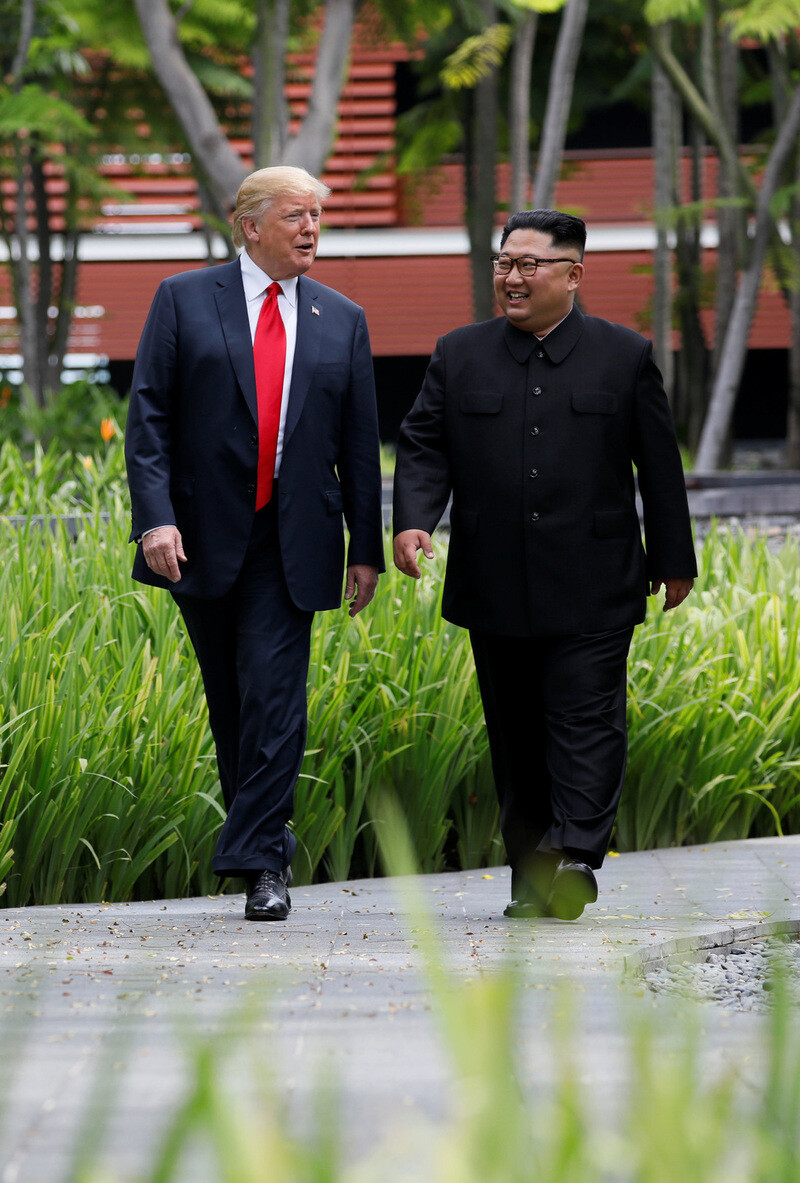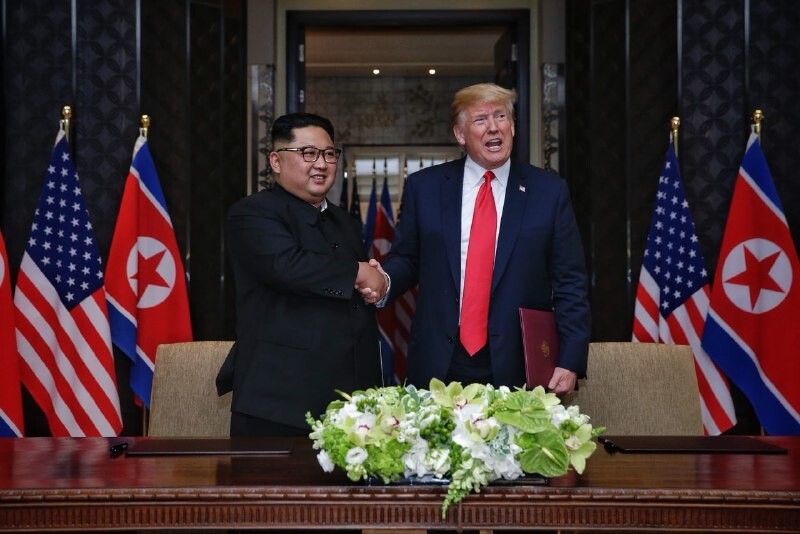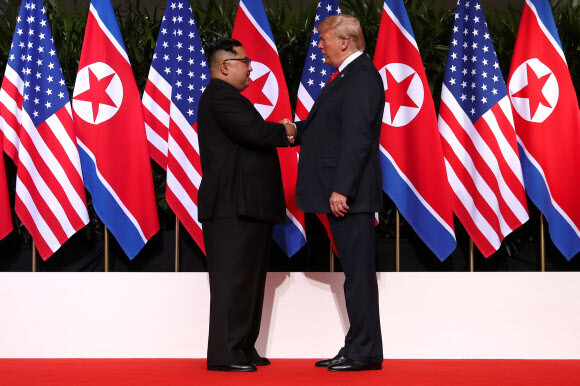hankyoreh
Links to other country sites 다른 나라 사이트 링크
[Editorial] Kim and Trump take first steps toward great change on Korean Peninsula

North Korea and the US have opened the door to a new era. North Korean leader Kim Jong-un and US President Donald Trump have put 70 years of hostile relations behind them and opened a new chapter in history by taking their first step on the road to peace, a road that has never been taken before.
During the first North Korea-US summit in history, which was held at the Capella Hotel in Singapore on June 12, the two leaders signed a historic joint statement that reconfigures their bilateral relations. By promising to carry out the denuclearization of the Korean Peninsula and to establish a new bilateral relationship, Trump and Kim have reached a major milestone in establishing piece on the Korean Peninsula and in Northeast Asia.
This is a sign of world-historical progress toward clearing away the last remnant of the Korean War that survived the Malta Summit between the US and the Soviet Union in 1989. We should reflect upon the significance of the first meeting between the leaders of North Korea and the US along with the 80 million people in South and North Korea and people around the world who long for peace.
It can be said that the greatest triumph of the North Korea-US summit on June 12 was the fact that Trump and Kim personally signed a joint statement that contains the promise of complete denuclearization and a guarantee of regime security. Along with this, the two leaders agreed to “establish new US-DPRK relations.” The very fact that a joint statement under the names of Trump and Kim contained these terms should be enough for the summit to go down as a success.
Until shortly before the summit was held, there had been varying predictions about whether an agreement would be reached and if so what form it would take. But the fact that the two leaders’ wishes were expressed in a highly formal joint statement should be regarded as highly significant. Kim Jong-un said that “the world will see a major change” before signing the agreement, and as his words suggest, the joint statement can be said to have paved the way for fundamental change in North Korea-US relations, making them far different from before.
The biggest question about this summit was whether North Korea and the US would reach an explicit agreement about “complete, verifiable and irreversible denuclearization” (CVID). At the end of much back and forth, the two sides settled on reconfirming the Apr. 27 Panmunjeom Statement and agreeing to “work towards complete denuclearization of the Korean Peninsula.” On the other hand, the compromise that the two sides reached on regime security, which is the item of greatest interest to North Korea, was the “efforts to build a [. . .] peace regime on the Korean Peninsula.”
In the end, it must be admitted, the two sides failed to reach an agreement at the highest level that would swap CVID for CVIG (complete regime security).
But given expectations that a swap of CVID and CVIG would not be easy, the fact that Trump and Kim signed even this kind of agreement should not be downplayed. The fact that the agreement contains a promise to thoroughly implement the Apr. 27 Panmunjeom Declaration and inter-Korean declarations and agreements of the past can be regarded as basically standing in for CVID. Consideration should be given to the fact that the limitations of the agreement were supplemented by the inclusion of the sentence “President Trump committed to provide security guarantees to the DPRK” in the full text of the joint statement.

Trump expressed willingness to halt military exercises
The fact that Trump went even further and expressed his willingness to halt South Korea-US military exercises during the press conference can also be seen as a measure designed to reassure the North. Since the North has long demanded the removal of the military threat, the US’s declaration of its intention to accept that demand will likely become a crucial incentive for progress in North Korea-US relations and the acceleration of denuclearization.
It is somewhat unfortunate that no details about the timetable for denuclearization – including North Korea’s initial steps in that direction – were contained in the joint statement. This appears to show that many obstacles remain before North Korea and the US can achieve complete trust. But it is telling that Trump said during the press conference that he would lift sanctions once it became clear that North Korea’s nuclear program is no longer a serious threat.
This can be taken as confirmation that if North Korea speeds up the dismantling of the aspects of its nuclear program that constitute a legitimate threat to the US – including its nuclear warheads and intercontinental ballistic missiles (ICBMs), sanctions can be lifted more quickly. Since the two leaders agreed to “commit to implement the stipulations in this joint statement fully and expeditiously,” follow-up meetings need to be held quickly to reach an understanding about real progress toward denuclearization.
The part of the joint statement about the “immediate repatriation” of the remains of American soldiers who died during the Korean War is a matter of interest to Americans which appears aimed at improving public opinion inside the US and greasing the wheels of upcoming negotiations. Since the joint statement promises that Mike Pompeo and a high-level North Korean official will soon hold an additional meeting, a more concrete agreement will have to be reached during follow-up negotiations.
In a particular, a swift breakthrough needs to be reached in upcoming negotiations aimed at producing a definite timeline for denuclearization and regime security, a timeline that did not appear in this joint statement. We also hope that the declaring the formal end of the Korean War, which did not occur during this summit, will be brought to a conclusion as soon as possible. Considering that Trump said that North Korea and the US would be meeting again next week, that meeting is something to look forward to.

Looking to past diplomatic successes
Recalling the China-US summit in 1972, which brought a fundamental change to China-US relations, and the Soviet Union-US summit in 1986, which heralded the end of the Cold War around the world, is enough to demonstrate that the North Korea-US summit on June 12 marks the beginning of the irreversible process of normalizing their bilateral relations. But numerous hurdles stand in the way of North Korea-US relations reaching that final goal. The only way for them to clear those hurdles is to cooperate in their efforts.
The meeting between the leaders of North Korea and the US owes a great deal to the mediation provided by South Korean President Moon Jae-in. It goes without saying that if not for the efforts of President Moon, who sat in the “driver’s seat” on the Korean Peninsula and kept his grip on the steering wheel in a difficult and dangerous time until the summit was ultimately pulled off successfully, North Korea and the US were unlikely to have begun the journey toward normalizing their relations so quickly. Moving forward, too, President Moon must spare no pains in guiding North Korea-US relations until their relations are firmly on course to normalization.
While North Korea and the US pledged unprecedented change during their summit, they have only cleared the first hurdle on the road toward the denuclearization of the Korean Peninsula and the establishment of peace. We cannot tolerate any obstacles on the road that lies before us. It can be said that the era of true peace and prosperity will only begin when all these hurdles have been cleared. We hope that South Korea, North Korea and the US will make a concerted effort to deal wisely with whatever difficulties arise.
Please direct comments or questions to [english@hani.co.kr]

Editorial・opinion
![[Column] Has Korea, too, crossed the Rubicon on China? [Column] Has Korea, too, crossed the Rubicon on China?](https://flexible.img.hani.co.kr/flexible/normal/500/300/imgdb/original/2024/0419/9317135153409185.jpg) [Column] Has Korea, too, crossed the Rubicon on China?
[Column] Has Korea, too, crossed the Rubicon on China?![[Correspondent’s column] In Japan’s alliance with US, echoes of its past alliances with UK [Correspondent’s column] In Japan’s alliance with US, echoes of its past alliances with UK](https://flexible.img.hani.co.kr/flexible/normal/500/300/imgdb/original/2024/0419/2317135166563519.jpg) [Correspondent’s column] In Japan’s alliance with US, echoes of its past alliances with UK
[Correspondent’s column] In Japan’s alliance with US, echoes of its past alliances with UK- [Editorial] Does Yoon think the Korean public is wrong?
- [Editorial] As it bolsters its alliance with US, Japan must be accountable for past
- [Guest essay] Amending the Constitution is Yoon’s key to leaving office in public’s good graces
- [Editorial] 10 years on, lessons of Sewol tragedy must never be forgotten
- [Column] A death blow to Korea’s prosecutor politics
- [Correspondent’s column] The US and the end of Japanese pacifism
- [Guest essay] How Korea turned its trainee doctors into monsters
- [Guest essay] As someone who helped forge Seoul-Moscow ties, their status today troubles me
Most viewed articles
- 1[Column] The clock is ticking for Korea’s first lady
- 2Samsung barricades office as unionized workers strike for better conditions
- 3[Editorial] When the choice is kids or career, Korea will never overcome birth rate woes
- 4[News analysis] After elections, prosecutorial reform will likely make legislative agenda
- 5S. Korea, Japan reaffirm commitment to strengthening trilateral ties with US
- 6All eyes on Xiaomi after it pulls off EV that Apple couldn’t
- 7After 2 months of delayed, denied medical care, Koreans worry worst may be yet to come
- 8US overtakes China as Korea’s top export market, prompting trade sanction jitters
- 9[Column] Has Korea, too, crossed the Rubicon on China?
- 10Hong Se-hwa, voice for tolerance whose memoir of exile touched a chord, dies at 76